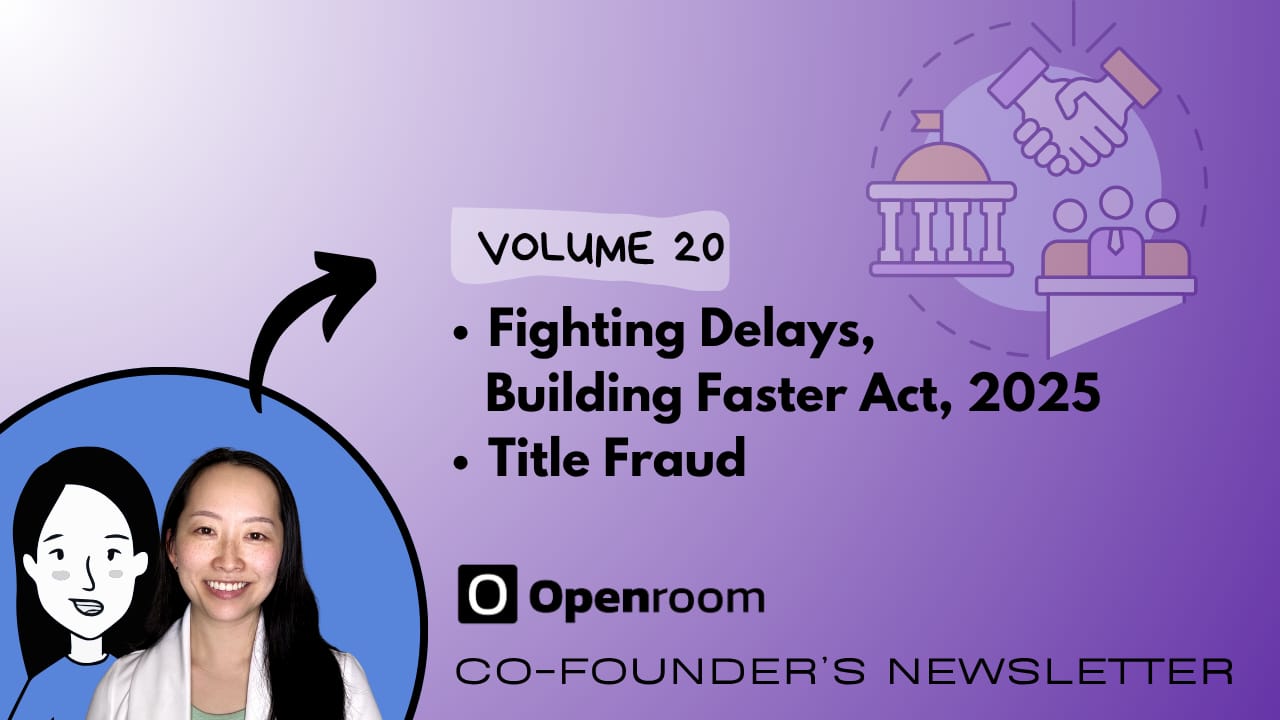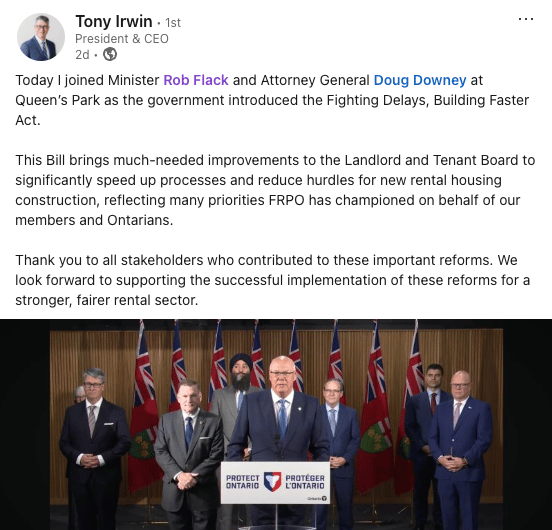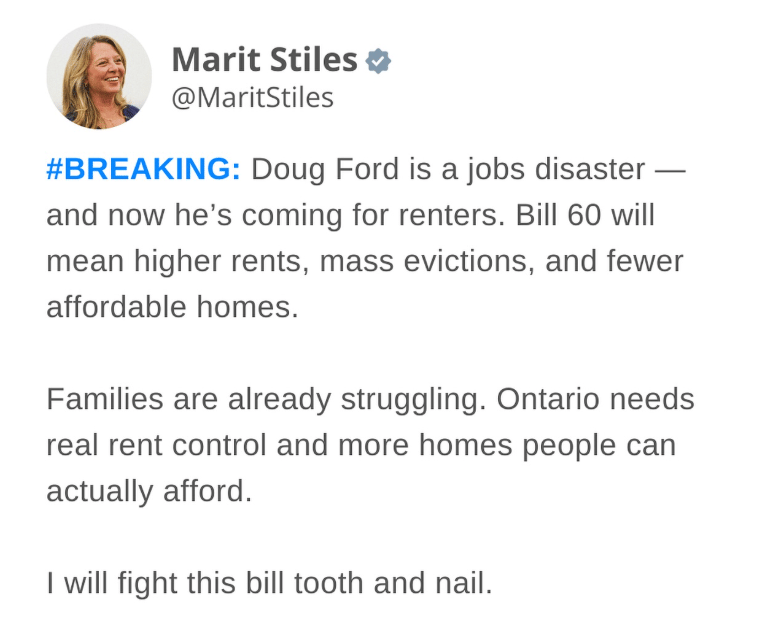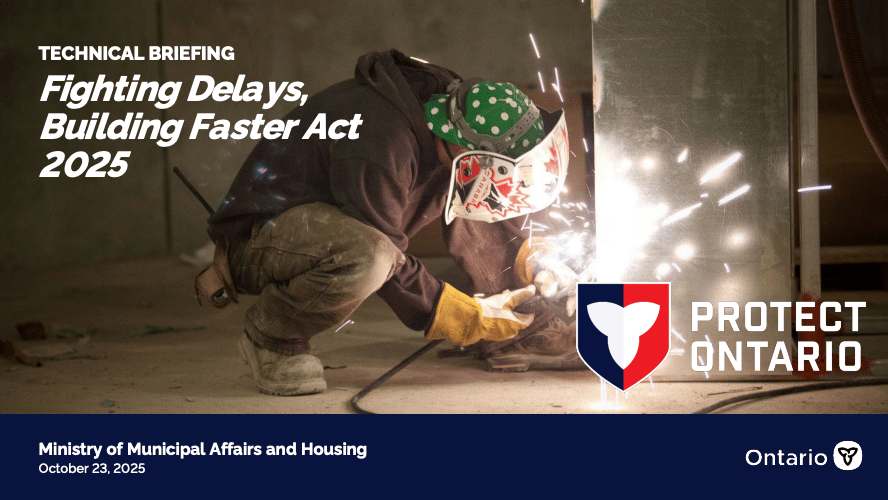- Openroom
- Posts
- Fighting Delays
Fighting Delays
Progressive And Aggressive Bill

Good morning / 早上好 / Bonjour / ਸ਼ੁਭ ਸਵੇਰ / Buen día friend!
In this Openroom Co-Founder Newsletter: Ontario’s newly introduced Bill 60, increase access to LTB records, and higher occurrences of title fraud.
Brought to you by:
Zensurance - Landlord Insurance. If you’re a housing provider, get a free quote to protect your rental property from damage, loss of rental income, and liability claims. Learn more.
Hot off the press this week is Ontario PC Government just introduced the Fighting Delays, Building Faster Act, 2025.
This community is talking about the section that references Fighting Delays at the Landlord and Tenant Board - Landlord and Tenant Board Reform.
Its purpose:
Help reduce delays;
Resolve cases faster for both tenants and landlords;
Increase supply of rental housing
Its got some very progressive and aggressive future-state proposals in there.
For example, one of the ones that many people are worried about is “security of tenure”.
Initiative: Lease Agreement Expiry
Current State: Under the RTA, all tenants have "security of tenure", which means that tenants have a right to remain in their rental unit as long as they follow the lease agreement and the RTA. Landlords cannot evict tenants without a legally valid reason, and after a fixed-term lease ends, the tenancy typically continues on a month-to-month basis.
Future State: The government would consult on alternative options on lease agreement expiry that could allow landlords to control who occupies their units and for how long, allowing them to adjust tenancy arrangements based on market conditions, personal needs, or business strategies. This could add flexibility for some landlords in the approach to leases, potentially unlocking additional rental unit stock
To say the rental housing community has been buzzing is an understatement. There are excited supporters and heavy critics.

President & CEO of the Federation of Rental-Housing Providers of Ontario says “This Bill brings much-needed improvements to the Landlord and Tenant Board to significantly speed up processes and reduce hurdles for new rental housing construction, reflecting many priorities FRPO has championed on behalf of our members and Ontarians.”
Credit: Tony Irwin, Linkedin

NDP leader Marit Stiles says Bill 60 will mean higher rents, mass evictions, and fewer affordable homes.
Credit: @MaritStiles, Facebook
What caught my eye?
Page 15, Fighting Delays at the Landlord and Tenant Board, referenced the following:
Initiative: Tribunals Ontario to explore options for increasing access to final Landlord and Tenant Board (LTB) decisions and orders
Current state: Each year the LTB sends between 5,000 and 10,000 orders to the Canadian Legal Information Institute to be posted online. The LTB focuses on those decisions with potential precedential value or which raise novel issues. There is a public interest in greater access to LTB orders than is currently available
Future state: Tribunals Ontario is exploring options to increase access to LTB decision orders with the aim of providing greater access and transparency of its decisions. This increased access will be another vetting resource available to landlords and tenants to consult prior to entering lease agreements.
This matters to us because we’ve been working towards a future of transparency in the rental ecosystem over the last 3 years. Making orders accessible to the public has been our focus since day 1.
I know that many of you have followed the Openroom journey from the beginning.
Well, look at that!
Our combined efforts with many other groups have gotten the attention of Premier Doug Ford’s government.
When are the changes going to take place?
When a bill gets introduced, it has to go through several stages before it becomes law.
The Ontario Conservative Party has a majority at Queen’s Park. Therefore, it’s likely that what is proposed will pass through each of the stages when the elected officials vote. If a party (aka team) has a majority government, then usually the Members of Provincial Parliament (MPPs) will vote accordingly to their party.
I’m learning along the way too.
To be fully transparent, I learned some basics by playing game on “how a bill becomes a law” and used some ChatGPT. I’ll be sure to keep you posted as I learn more.
📚 Educational Read
Check out an educational contribution related to Title Fraud in Ontario from Lawyer Shubh Amrit Vir Singh Randhawa (Barrister, Solicitor, and Notary Public) of Simpli Legal.
Title fraud occurs when someone steals the legal ownership (title) of a property through deception or identity theft. The fraudster may impersonate the true owner, using fake identification to transfer the property to themselves or to a third party. Once they appear as the registered “owner,” they can use the property as collateral for a large mortgage or even attempt to sell it to an unsuspecting buyer.
Unlike common real estate scams, title fraud attacks the very heart of property ownership — the land registry system. Because Ontario’s land registration operates on a “mirror principle,” meaning what’s on title is presumed accurate, victims often face immense difficulty reversing fraudulent transfers.
💜 From your Openroom community
Last newsletter, 90% of you said “you or someone you know has experienced a mental health condition”. Even when this newsletter readership has multiplied 3X, the answers from you stay the same.
I promised to send gourmet popcorn care packages to certain readers. Congratulations to Jennifer (Broker at Sotheby’s International Realty) and Carol (Properties CW in Ottawa) for winning the random draw prize packs from the last newsletter!
For those who have kids, happy trick or treating!
What you think about Bill 60?Once you vote anonymously, you can see the community's response. |

Weiting Bollu
Mom, Rental Housing Provider, Rental Housing Advocate, Educator, and Openroom Co-Founder & CEO
What does my team at Openroom do?
At Openroom, we aggregate tenancy court orders across Canada, extract information from them, and put it to public use (e.g. public record search for tenant screening, rental debt reporting to Equifax, legal research for all, reduce delinquency risk while renters get to build credit).
We also educate about rental housing, provide free resources, and we advocate for a more transparent and connected rental ecosystem to support both responsible housing providers and residents.



